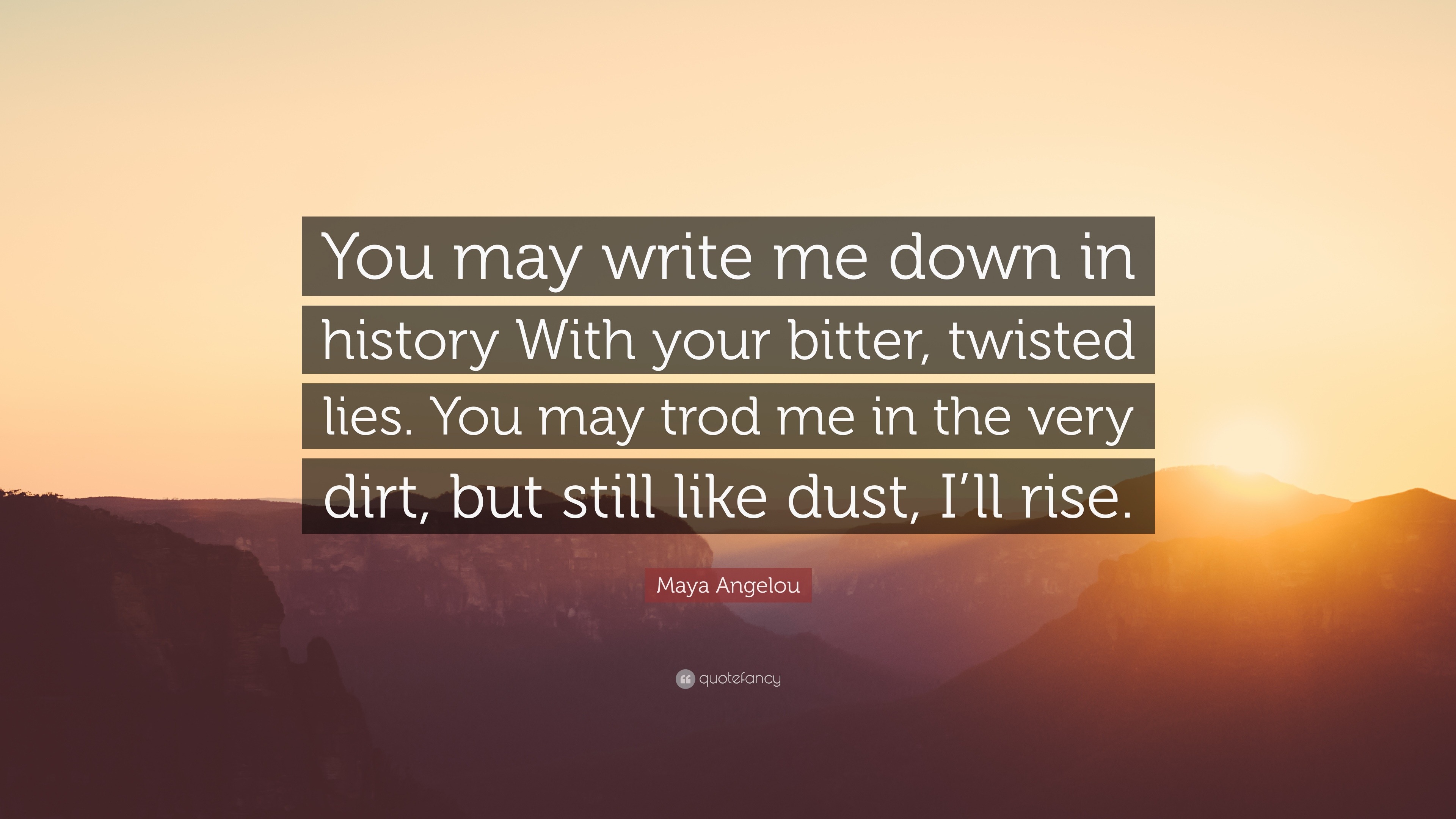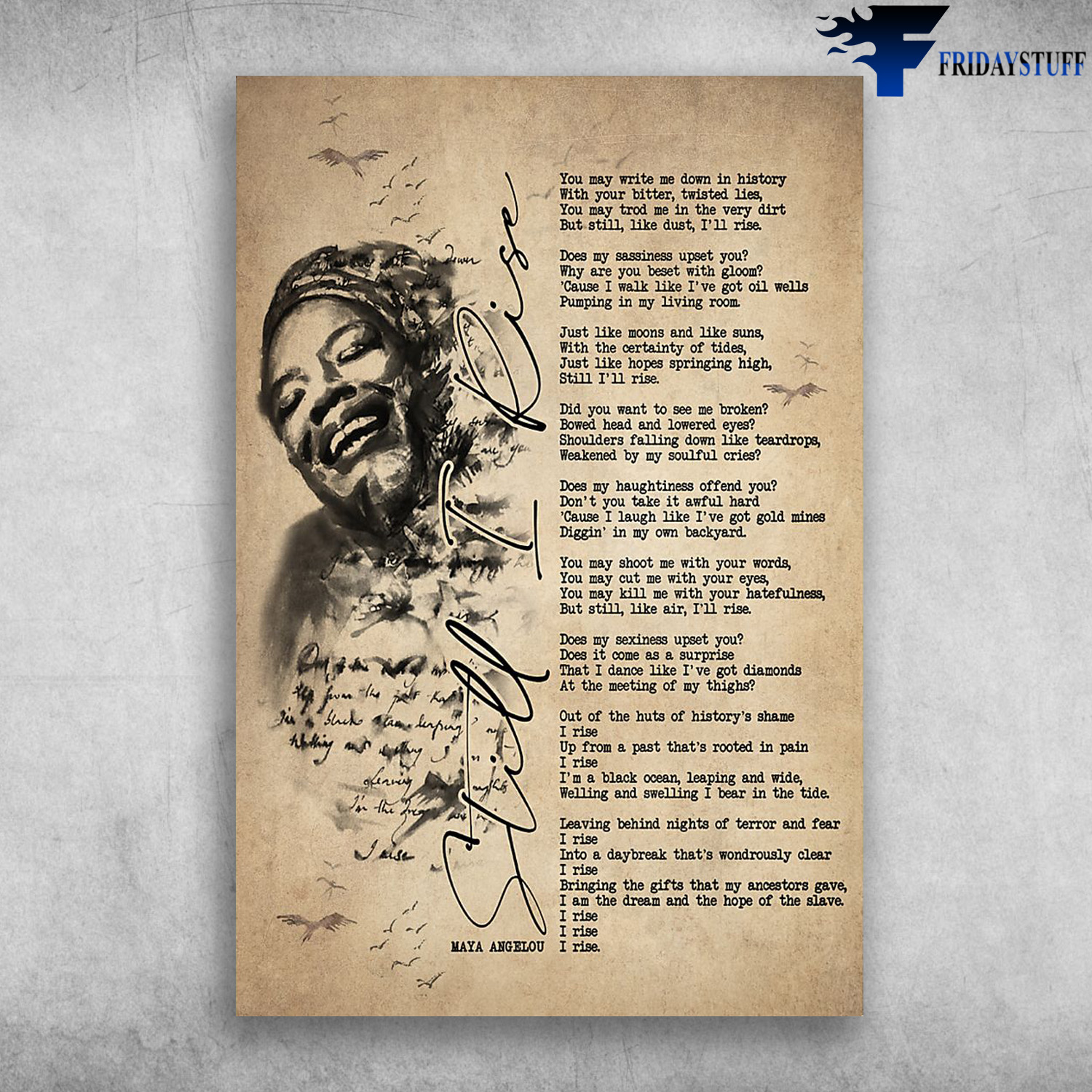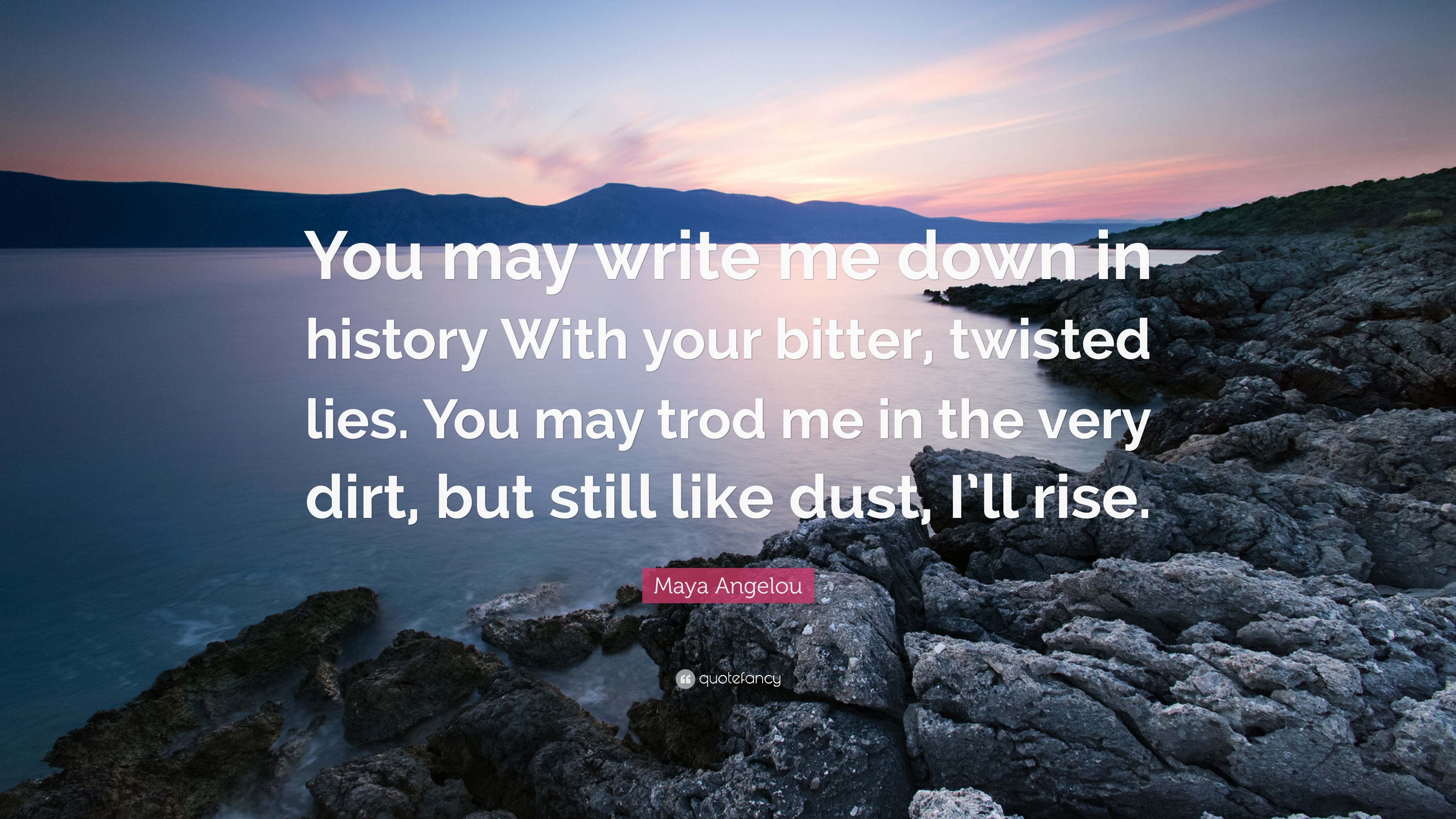"Still I Rise": Defiance In The Face Of History's Lies & Prejudice
Can words truly wound? Maya Angelou's poetry, particularly in her iconic work "Still I Rise," powerfully argues that they may try, but the spirit, the essence of the self, will always endure, rising above the ashes of adversity.
The poem, a resounding anthem of resilience, was born from a life steeped in challenges. Angelou, a celebrated poet, memoirist, and civil rights activist, drew upon her own experiences of racism, trauma, and societal oppression to craft verses that resonated deeply with readers across the globe. "Still I Rise," a testament to the unyielding human spirit, is more than just a collection of words; it's a declaration of defiance against those who seek to diminish and demean.
The genesis of the poem can be traced to a time of profound personal and societal upheaval. Angelou, witnessing firsthand the injustices faced by Black Americans, found solace and strength in her writing. The poems themes perseverance, dignity, and unwavering self-belief are woven throughout the fabric of her life's work, reflecting her indomitable spirit. The lines, seemingly simple, are laden with layers of meaning, echoing a profound understanding of the human condition and the ability to overcome.
The poem's opening lines immediately establish its central theme: "You may write me down in history / With your bitter, twisted lies, / You may trod me in the very dirt / But still, like dust, I'll rise." Here, Angelou confronts the historical context of her experience, acknowledging the deliberate attempts to misrepresent and marginalize her and her community. The "bitter, twisted lies" represent the narratives constructed to justify oppression, narratives she refuses to accept. The "very dirt" symbolizes the depths of degradation and humiliation she might be subjected to. Yet, in the face of all this, she declares, "still, like dust, I'll rise." This powerful metaphor of dust, easily dispersed but ultimately returning, speaks to the enduring nature of the human spirit. It also implies the idea that the "dust" of history will inevitably settle, and the truth will eventually be revealed.
The poem continues, moving from historical context to personal strength. Lines like "Does my sassiness upset you?" and "Does my haughtiness offend you?" are not mere rhetorical questions; they are weapons. They challenge the very foundations of the oppressors' power, forcing them to confront their own insecurities and prejudices. Angelou's defiance is not passive; it is active, bold, and unapologetic.
The poem's rhythm and structure contribute to its overall impact. The repetition of phrases like "still I rise" and the use of rhetorical questions create a sense of momentum and unwavering resolve. The simple, yet evocative language ensures that the poem remains accessible and relatable, transcending cultural boundaries. Each stanza builds upon the previous one, culminating in a powerful affirmation of self-worth.
Angelou's use of vivid imagery further enhances the poem's power. The images of the "black ocean, leaping and wide," and the woman laughing "like I've got gold mines diggin' in my own backyard," paint a picture of strength, abundance, and limitless potential. These images counter the negative stereotypes and portray a vibrant, self-assured Black woman, refusing to be defined by the limitations imposed upon her.
The poem also touches upon the subjectivity inherent in the writing of history. "You may write me down in history / with your bitter, twisted lies," she writes, acknowledging that those in power often control the narrative. However, the poem asserts that despite these attempts at control, the truth will eventually emerge. This defiance against the rewriting of history is a core tenet of the poem's meaning.
The poems ability to resonate with diverse audiences is a testament to its universal themes. The struggle against oppression, the importance of self-belief, and the power of resilience are experiences shared by people across cultures and throughout history. Angelou's work, therefore, transcends the specific context of the civil rights movement and speaks to the core of what it means to be human.
The enduring appeal of "Still I Rise" lies in its message of hope. Despite the challenges and setbacks, the poem offers a path towards empowerment. By refusing to be defeated and by celebrating one's own self-worth, it suggests that anyone can overcome adversity. Angelou's work reminds us of the strength that can be found within each of us, urging us to rise above the limitations imposed by others, and indeed, by ourselves.
Furthermore, the poems influence extends beyond the literary realm. It has become an anthem for social justice movements, inspiring individuals and communities to fight for equality and dignity. It has been recited at protests, graduations, and countless other events, carrying its message of empowerment and resilience into the hearts and minds of people around the world.
The poems lasting legacy is a testament to Maya Angelou's profound understanding of the human condition and her extraordinary ability to articulate complex emotions with simplicity and grace. "Still I Rise" is not just a poem; it is a call to action, a source of inspiration, and a reminder that the human spirit, like dust, will always find a way to rise.
| Bio Data | Details |
|---|---|
| Full Name: | Marguerite Annie Johnson (Maya Angelou) |
| Born: | April 4, 1928, St. Louis, Missouri, U.S. |
| Died: | May 28, 2014, Winston-Salem, North Carolina, U.S. |
| Nationality: | American |
| Occupation: | Poet, Memoirist, Civil Rights Activist, Singer, Dancer, Actress, Editor, Professor |
| Known For: | "I Know Why the Caged Bird Sings" (memoir), "Still I Rise" (poem), her work in the Civil Rights Movement |
| Notable Awards: | Presidential Medal of Freedom, National Medal of Arts, three Grammy Awards |
| Spouse(s): | Ennis B. Shammah (m. 19511954), Paul du Feu (m. 19731983) |
| Children: | Clyde "Guy" Johnson |
| Education: | Received honorary degrees from numerous universities, including Wake Forest University and Smith College. |
| Literary Movement: | African-American literature, Civil Rights literature |
| Influences: | W.E.B. Du Bois, James Baldwin, Langston Hughes, William Shakespeare, the Bible |
| Influenced: | Toni Morrison, Oprah Winfrey, Barack Obama, many contemporary poets and writers |
For more in-depth information, you may find the official Maya Angelou website informative: https://mayaangelou.com/
The poem is structured around a series of powerful rhetorical questions, each designed to challenge the listener and affirm the speakers indomitable spirit. Lines like "Does my sassiness upset you?" and "Does my sexiness upset you?" are not simply questions but provocations, highlighting the speaker's refusal to be defined by the expectations and prejudices of others.
"You may shoot me with your words, / You may cut me with your eyes, / You may kill me with your hatefulness, / But still, like air, I'll rise." These lines illustrate the power of words to wound but also emphasize the speaker's ultimate resilience. The image of air, essential for life, suggests an unwavering ability to survive and thrive, no matter the adversity faced. The comparison is potent: even if the worst happens, the speaker will persist.
The imagery employed throughout the poem is crucial to its effectiveness. "I'm a black ocean, leaping and wide," represents the speaker's expansive strength and untamed nature. The metaphor of a "black ocean" suggests depth, power, and a boundless capacity for life. This imagery counters the historical tendency to diminish and stereotype Black individuals, instead celebrating their inherent beauty and strength.
The poems influence and impact extend beyond the literary world. It has become an anthem for the Civil Rights Movement and continues to inspire social justice advocates worldwide. The call to rise above oppression resonates with anyone who has faced adversity. It is a poem of defiance, affirmation, and hope.
The concluding stanzas reiterate the central theme of resilience. The speaker asserts that she will not be defined by the negativity of others. The lines "Don't you take it awful hard / 'Cause I laugh like I've got gold mines diggin' in my own backyard" show confidence and the ability to find joy and fulfillment despite external challenges. This joy acts as a shield against the negativity directed towards her.
The power of "Still I Rise" lies in its simplicity and universality. It offers a message of unwavering hope and the indomitable spirit of the human being. It is a reminder that no matter the circumstances, we can find within ourselves the strength to overcome adversity. Maya Angelou's work serves as a guide for those seeking to rise above the challenges of life.
The phrase "You may write me down in history" serves as a challenge to those who attempt to control the narrative. It signifies the acknowledgment that the past is often told from the perspective of the powerful, which is a common theme throughout the entire piece. This line does not simply acknowledge the injustice; it also sets up the poem's central act of defiance.
The repetition of the line "You may write me down in history / With your bitter, twisted lies" throughout the poem emphasizes the speakers awareness of historical biases. It highlights the fact that history is often subjective, and the dominant narrative can be skewed by prejudice. The poem addresses the potential for misrepresentation of individuals and communities, which is part of the larger struggle for equality and social justice.
The imagery in "Still I Rise" is carefully constructed to empower and inspire. The line "I'm a black ocean, leaping and wide" is a powerful metaphor that underscores the speakers expansive identity. The imagery used throughout this poem transcends its specific historical context.
The poems use of rhetorical questions is a core element of its appeal. Questions such as "Does my sassiness upset you?" and "Does my haughtiness offend you?" create a sense of defiant self-assuredness. The questions are designed to confront the prejudices of the reader or listener.
The phrase "Don't you take it awful hard / 'Cause I laugh like I've got gold mines diggin' in my own backyard" is another example of resilience. It suggests an inner wealth and confidence. The laughter is a source of strength and liberation.
The line "You may shoot me with your words, / You may cut me with your eyes, / You may kill me with your hatefulness, / But still, like air, I'll rise" shows the speaker's determination to survive despite the potential harm. This determination offers hope for those struggling with oppression.
This poem's capacity to reach diverse audiences lies in its universal themes of overcoming adversity and celebrating personal strength. Angelous experiences, though specific to her background, speak to a broader human experience of resilience and defiance.


